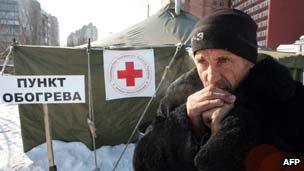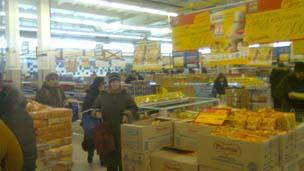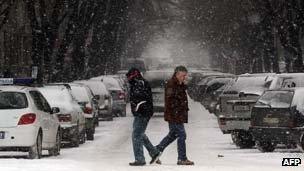Europe freeze: Your stories
- Published
More than 100 people have now died as a result of freezing weather in Ukraine since last Friday, the government in Kiev has announced.
More cold weather deaths have been reported across central and eastern Europe as temperatures dropped to below -35C in some countries.
BBC News website readers in the countries affected have spoken about the freeze:
Andrew Shell, Pavlograd, Ukraine

Heated shelters have been set up in Ukraine to help homeless people
The cold in Ukraine is severe. We had school on Monday and Tuesday, but on Tuesday the students and staff were told that school would be cancelled the next day.
Schools in general have been cancelled for the duration of this week as the temperature inside the heated classroom is 10C. There is a general rule that once temperatures hit -20C, school is cancelled.
Commerce has suffered as many businesses can't receive new shipments. Many ATMs in particular are closed because no new cash can be brought in. However, life goes on.
Ukrainians are a resilient folk. According to them, this weather was the standard many years ago, before winters began to weaken. That is blamed on both global warming and Chernobyl here.
I live in an apartment that is fine, so I am warm enough in here. I also prepared for the weather, knowing that Ukraine would have cold winters. A friend of mine who works in another school got mild frostbite after walking home from work without gloves on.
There are usually a lot of stray cats and dogs around here. I don't know where they went or if they died of the cold, but they are not around any more.
There had been a certain amount of complacency about the weather. January was so mild without snow but winter came with a vengeance last week.
Natam Levinson, Pinsk, Belarus

"The supermarkets only run to the most basic products"
My area, which is called "the Belarus resort" by many, is said to be one of the warmer places in this country. However, this morning, the temperatures were at -28C.
It warms up during the day (the temperature is now at -18C) but we've heard that the weather will get colder over coming days.
It is quite dramatic. You can't go out of the house for more than one or two minutes.
Shelters have been put up in various places. These mainly cater for the homeless, but I have also seen them give out supplies to people who are simply in need of warmer clothing and better food.
I am fortunate. My apartment is well-heated and I live close to the place I work. I have a car so I am able to travel if I need to. However, the trains here are over 50 years old and many people may find it impossible to go to other towns in Belarus.
I think heating has been a problem for some people. Flats and houses in Belarus tend not to have carpets, which means the insulation is not brilliant. It needs heaters, jumpers and other things to bring up the temperature.
The police force and transport services have also had problems. This is generally because they can't start their cars. It means that we are running low on some supplies - the supermarkets, which are never brilliantly stocked, now only run to the most basic products.
There has been a lot of snow, but this has stopped in the last couple of days and it is mostly ice at the moment. Now we are just waiting for the snow to start again.
Olivera Milosaviljedich, Aleksinac, Serbia

"We are used to this amount of snow"
It is snowing heavily here, which is creating problems for the traffic, but we are used to this amount of snow.
The real problem is the cold.
Outside at the moment it is -13C, but temperatures are dropping below -20C to even -39C. It is very, very cold outside.
This is causing problems for students too. The snow on the roads and the cold means that children cannot get to the school from their villages and towns.
Many of the roads are blocked and it is just too cold.